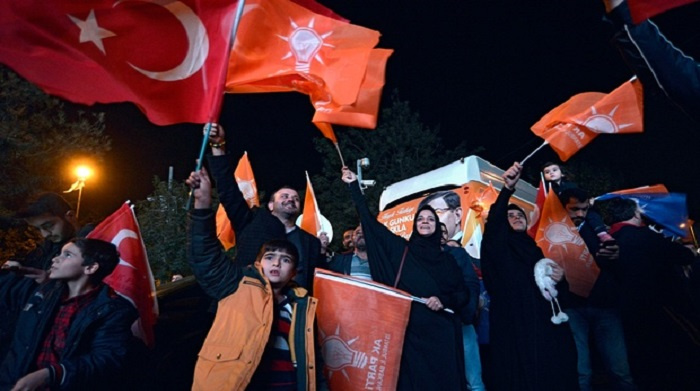Iran, Turkey and Russia’s Regional Necessities

For five centuries, Iran has been involved in the military and political developments and ambitions of two big countries which are geographically located next to each other. In this equation, Iran plays a moderate role and the two powerful neighbors are Russia (the former Soviet Union) and Turkey (the former Ottoman Empire).
In Turkey, the government, supported by Erdogan and the Justice and Development Party, won early elections (in a very engineered way) and compensated for its relative defeat in the past months, gaining the necessary votes to establish the government. Many Turkish citizens felt that maintenance of the present government and its security policies was necessary for the continuation of the stability, security and economy of the country. The war in Syria and Iraq and confrontations with Kurds inside and outside could draw Turkey towards the unrest in the Middle East. Erdogan expected to gain the three-fourths majority of the votes so that he could change the constitution in favor of his personal power or, with at least two-thirds of the votes, he could make the same changes through a referendum, but he did not succeed. This crisis united the opposition and they were able to maintain at least 10% for their presence in the parliament. In fact, it should be pointed out that while economic development would increase national power, it could, at the same time, create limitations against political ambitions and adventurisms. We saw that the fight against the Taliban in Afghanistan was not an easy task. Since eight months ago, the same situation is being seen in Yemen with Saudi Arabia’s show of power and Yemen is now similar to Afghanistan.
But the situation is different in Turkey. With all its industrial and military power, Turkey can act as a powerful military player in the region but it would be more vulnerable than those countries if its hostile rival forces gain momentum. Turkey relies highly on the network of electricity, gas, fuel, water and energy. In other words, if these networks are shut down for any reason, big cities like Istanbul, Izmir, Ankara and others will be totally paralyzed. But similar situations would not affect the tribal lives in Afghanistan and Yemen. This warning is not aimed at creating fear about the issue of economic development; it should, on the contrary, be respected while considering these threats and it will lead to social and cultural developments which will spread wisdom and moderation. Today most of the countries of the region are at this juncture.
Both Iran and Russia are safe and good markets for Turkish high-quality industrial products. Turkey is also a good market for the oil, gas and petrochemical products of Iran and Russia. All of them have suffered from the terrorism of the Wahhabi radicals. Perhaps at one time Turkey was deceived by Saudi Arabia, which intends to expand its Wahhabi-Arab rule, in order to find a place for itself in Iraq and Syria; but in practice, it destroyed its two rich neighboring markets.
Russia is a military power and has huge resources and the West could not tolerate such power. Europe’s measures in Ukraine only disrupted the Slavic balance which existed between Russia and Ukraine, which is considered as the historical mother of Russia and Belarus, and led to the predictable annexation of Crimea to Russia and confusion of the Russian-inhabited eastern parts of Ukraine. Today, Russia, which cannot bear to lose its only sea base in the Mediterranean Sea, has made attempts to become more directly involved in the fight against Syrian opposition forces based on the demand of the Syrian government. Western governments have also threatened to continue their intervention without the government’s demand. It seems that every country attempts to get involved, from Yemen to Syria to Libya.
Under such conditions, Iran was invited to the Vienna Conference. Prior to the agreement reached between Iran and the P5+1 and during the time of the UN Security Council sanction resolutions against Iran during the Ahmadinejad administration, there was always the excuse that Iran was a threat against global peace and security. Today and after the adoption of the new resolution, that chapter ha ended in history and the obstacles to invite Iran have been removed. Under the present conditions and considering what has happened to the neighboring countries, Iran’s Foreign Ministry seeks to play a moderate, logical and safe role. Iran and Turkey are bound to live alongside each other. They deserve to expand their trade and touristic and human relations and not be damaged by the imposed hostilities especially by Saudi Arabia. Iran should cooperate with Turkey and even act as a constructive mediator in Turkey’s relations with the government in Syria and non-Salafi opposition and also in the interaction with Iraq and preparing the ground for peaceful and stable conditions in the region. Perhaps, one strategy could be to establish a union between Iran, Turkey, Iraq and Syria in order to create another economic region similar to that of Europe’s common market or southeastern Asia Union wherein Iranians, Turks, Arabs and Kurds could live in peace and stability. In summary, the experiences of the past 300 years show that maintaining Iran’s independent economic and political relations with the effective countries of the world, including Russia and the West, is preferable over the behaviors which are in contradiction with the national interests of Iran.

